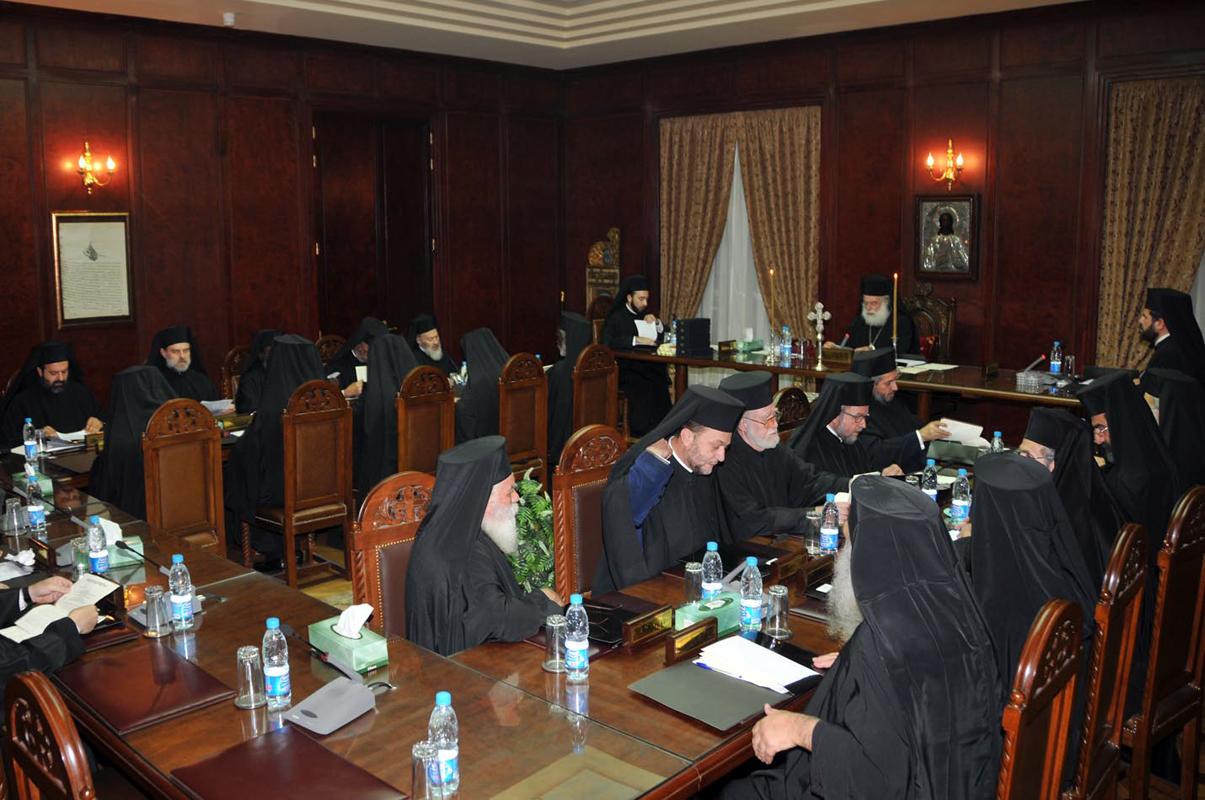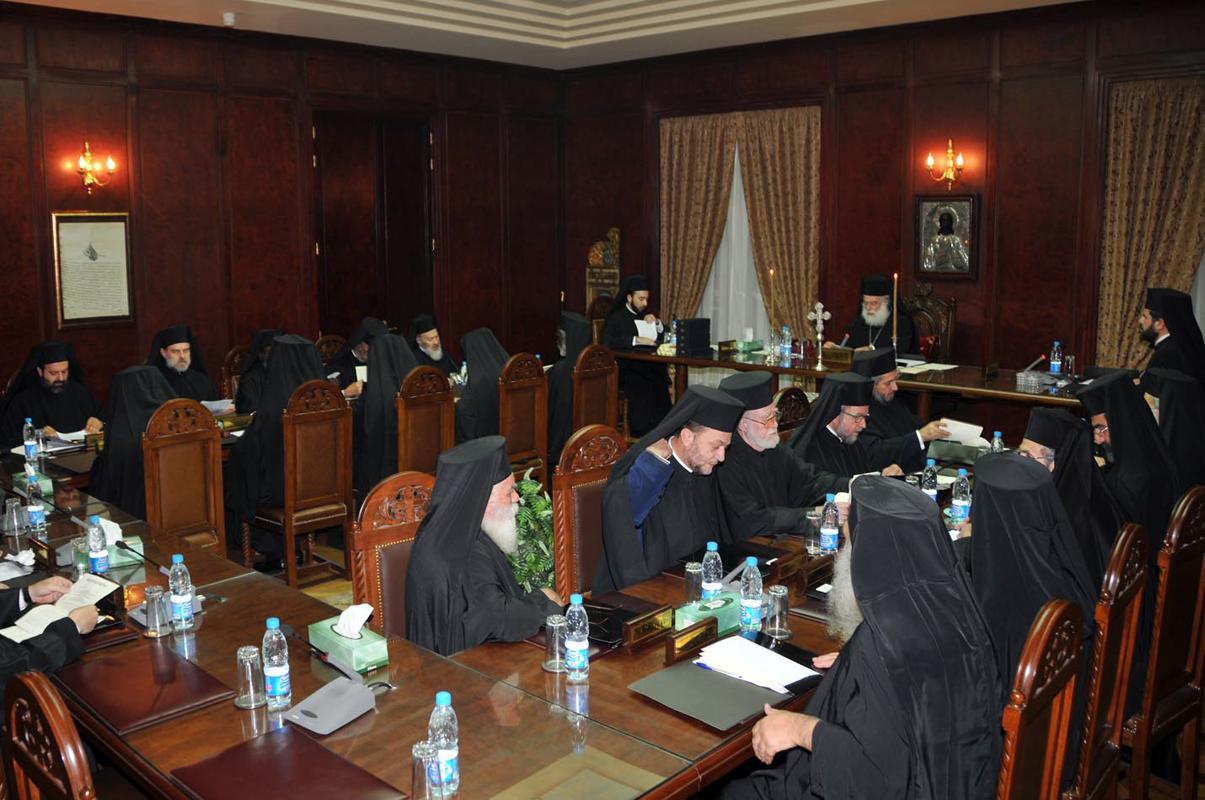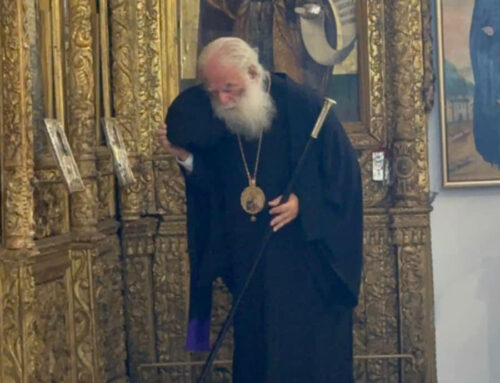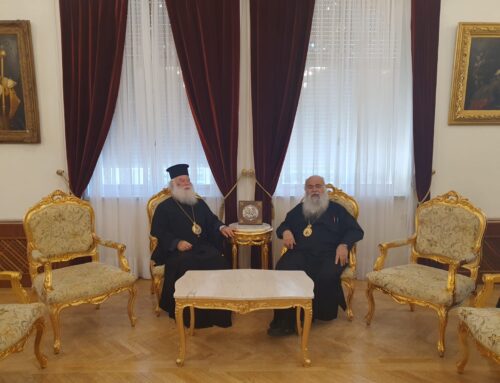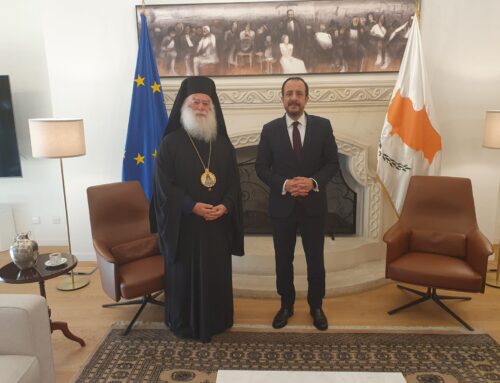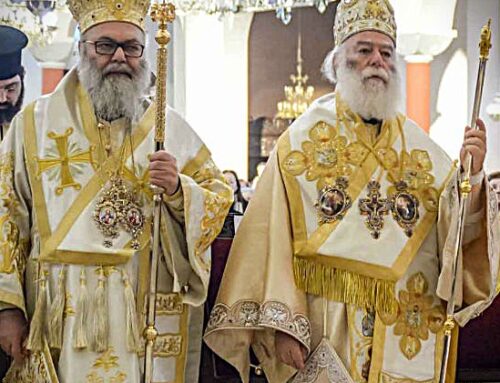With the briefings of the Body of Hierarchs by Their Eminences the Metropolitans and the Bishops who represented the Venerable Priate and the Alexandrian Church at Inter-Orthodox, Inter-faith and Inter-Christian dialogues and international conferences, the examination of contemporary multi-level social problems, as well as the approval of the final text of the Synodal Decree Against Religious Violence, the deliberations of the Holy Synod of the Patriarchate of Alexandria and All Africa were completed on 23rd November 2012.
Closing the deliberations of the Holy Synod, His Beatitude Theodoros II, Pope and Patriarch of Alexandria and All Africa expressed his heartfelt thanks to all the hierarchs of the Apostolic Throne of St Mark for their laborious and sacrificial pastoral efforts which they perform on the African continent, emphasizing that at the centre of missionary activity, what irrevocably still remains is the spiritual preparation of the Christian people and Evangelization and the development of the quality of life of our African borthers and sisters, with particular concern for orphaned children, the fight against diseases and the development of education.
In his reply, His Eminence Kallinikos of Pilousion praised the ceaseless paternal care of the Venreable Primate for the clergy and the people of the anceitn Church of Alexandria.
His Beatitude then hosted an official farewell lunch in the Great Patriarchal Refectory in honour of the Honoured Members of the Holy Synod.
SYNODAL DECREE AGAINST RELIGIOUS VIOLENCE
The Holy Synod, convened and presided by His Beatitude Theodoros II, Pope and Patriarch of Alexandria and All Africa of the Patriarchate of Alexandria, proclaims the following:
Recently, mankind has been witness to a series of explosions of religious violence, shattering social peace under the guise of intimidations, persecutions, forced deportations, tortures, or even executions. These heinous actions, beyond and outside of any boundaries of logic and wisdom, bring to mind images of dark periods, which we all hopped they had irrevocably passed into oblivion of history.
The fuelling of the phenomenon of religious violence, over and above the particularly negative social and psychological consequences on a local level, discredits, through the speedy social interactive information, the image of cultures and religions on a global level, opening through the uncontrolled psychological excitement and the illogical emotional mobilization of the masses, irreconcilable chasms and impregnable walls between people of differing confessional identity.
The use of violence under the mantle of faith, is a total perversion of the meaning of whichever religious tradition, as religions in their entirety ought to operate as agents of reconciliation among people. In particular, it is totally incompatible with those who believe in Christ not only using violence but also tolerating violence.
It is necessary to emphasize that violence as a practice does not only invalidate the meaning of the Gospel, but is essentially a denial of Christ who, in His divine and human nature, hypostasizes love, according to the words of John “God is love” (John 4:8), peace as “the peace of God which passes all understanding” (Philippians 4:7), and finally life itself according to the true Gospel word “I am the Resurrection and the life” (John 11:25).
Throughout its history, Orthodoxy has endured the violence of persecution from regimes of different racial and religious identity, or from antichristian regimes, as witnessed in its records of Saints, being adorned by the figures of heroic Martyrs and Confessors, who gave their lives out of love for Christ. In any manner the supreme example of love and sacrifice for the existential authenticity and salvation of man is the God-man Jesus Christ Himself, who gave His life as an innocent victim for the unity of mankind with God.
Having as unmistakeable direction indicator the condescension of God, who “so loved the world that He gave His only-begotten Son, so that all who believe in Him, should not perish but have everlasting life” (John 3:16), we wish to address our Christian brothers and sisters throughout the African continent, and all over the world who suffer for their faith.
We call on them to remain inalienably faithful to the confession of love of our faith, not forgetting that our Lord assured us on the one hand of the disastrous nature of violence, stressing that “all who take the sword will perish by the sword” (Matthew 26:52), and on the other hand of the merit of self-sacrificial piety, saying: “all who acknowledge me before men, him will I also confess before My Father who is in heaven” (Matthew 10:32-33).
We call on all those who commit inhuman actions of religious violence or who show tolerance towards it, to consider that God, as Creator, Beginning and Source of the world, is the God of all nations and all people, a God of Love, Providence and Salvation “according to the multitude of His mercies” for all of His creation.
We call on national and international political, peacekeeping and humanitarian agents to pursue active policies to halt the insanity of religious violence, acknowledging that the exploitation of religious sentiment and the inability of understanding and tolerating of religious diversity must cease to act as the Trojan Horse of the sanctification of religious intolerance and religious fanaticism.
It is time for humanity to stop calling on God to serve divisive or terrorist choices, whether collective or individual. It is time to marginalize psychopathological obsessions of zealotism in regard to missions being ostensibly assigned from God, and materialized by using every possible means, even aggressive or retaliatory violence. It is time for people to stop politicizing religion, to stop making politics a religion and to falsify religious faith, by ascribing to it tendencies of totalitarianism, chauvinism and tribalism so as fake holy wars to be hatched.
On the threshold of the third millennium from the redeeming incarnation of the Son and Word of God, mankind understands on the one hand the timeless application of the axiom “a city without holy places and gods……no traveller has ever seen or will ever see” (Plutarch. To Colotes Epicurean, 31), and on the other hand the obvious principle that peace cannot possibly exist without peace between religions.
The Patriarchate of Alexandria as the most ancient bearer of the Word of the Gospel in Africa, struggles daily for the existential conveying of the word of Christ as the path to sanctification and theosis. From this position it radically rejects and categorically disclaims all manner of religious violence as a stalemating expression of moral complicity of faith with violence, as an undesirable expression of humiliation and fall of man; the pinnacle of the divine creation.
To this end it strives through its ministry, charities, and sacrificial offer towards the adoption of a loving and compassionate conscience, adverse to blind instincts; a conscience, which, being stimulated towards “not to our fellows only, but to all humans” (Cyril of Alexandria, PG 72, 686), may be able to oust the irrational violence and to be forged into the dwelling place of God; a conscience, which may be temporarily contracted to the earthly homeland, yet it is eternally seeking the true homeland, the heavenly kingdom of God.
The Great City of Alexandria, 23rd November 2012
THEODOROS II
† Pope and Patriarch of Alexandria and All Africa
† Elder Petros of Aksum
† Elder Kallinkos of Pilousion
† Jonah of Kampala
† Seraphim of Zimbabwe and Angola
† Alexandros of Nigeria
† Sergios of Good Hope
† Athanasios of Cyrene
† Alexios of Carthage
† Ieronymos of Mwanza
† Proterios of Ptolemais
† Georgios of Guinea
† Nicholas of Ermopolis
† Dimitrios if Irenopolis
† Ioakeim of Zambia and Malawi
† Damaskinos of Johannesburg and Pretoria
† Ignatios of Madagascar
† Emmanuel of Khartoum
† Gregorios of Cameroon
† Gabriel of Leontopolis
† Savvas of Accra
† Nikiphoros of Central Africa
† Meletios of Katanga
† Ioannis of Mozambique




